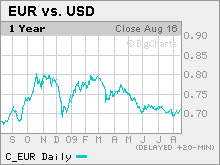Dollar slides against euro
Better-than-expected German investor sentiment shoots to highest level since April 2006, supporting the 16-nation currency.
NEW YORK (Reuters) -- The dollar and yen fell Tuesday after a strong report on German investor sentiment and gains in stock markets worldwide eroded safe-haven demand for the two currencies.
The euro rose from multi-week lows against the dollar and yen, while sterling gained as data showed UK consumer prices held steady in July. A rise in oil prices also helped the New Zealand and Australian dollars rebound from Monday's slide.
Global stock markets recovered from the previous day's sharp fall, boosting risk appetite and more than offsetting a surprise drop in U.S. housing starts in July.
"We had the strong (German) ZEW survey and that bolstered sentiment, (which) spilled over into the U.S.," said Matthew Strauss, senior currency strategist at RBC Capital Markets in Toronto. "The market became a little bit more confident that maybe yesterday's sell-off was a bit excessive."
"Although (U.S. data) came in slightly softer than expectations, it did not derail the notion that a clear bottom is forming in U.S. housing activity; neither did it derail the tentative return of risk appetite," he added.
In late New York trading, the euro was up 0.4% at $1.4132, above Monday's two-week low of $1.4044. It hit above $1.4150 after data from Germany's ZEW think tank showed investor sentiment improved more than expected in August to its best level since April 2006.
The euro was also up 0.7% at ¥133.83, while the dollar added 0.2% to ¥94.71.
Markets welcomed news of improved investor sentiment in Germany, which came after data showed the country, the euro zone's biggest economy, exited recession in the second quarter. But analysts said the hurdles it faces were capping euro gains.
CMC Markets chief market strategist Ashraf Laidi in London said the "lack of follow-through" in the euro's advance underscored the tentative mood among investors.
"Each recovery in the euro lately is looking more and more short-lived," he said. "The question becomes: Is the market betting on a recovery that is far from confirmed?"
The ICE Futures U.S. dollar index, which tracks the performance of the greenback versus a basket of six other major currencies, was down 0.4% on the day.
Losses in the dollar were limited as data showing an unexpected 1% slide in housing starts in July unnerved some investors, as did a larger-than-expected 0.9% slide in producer prices last month.
The troubling data came after a survey late last week showed U.S. consumer confidence fell for a second consecutive month in July, adding to concerns that hopes for a robust rebound in the remainder of 2009 may have been overdone.
"We've seen a sharp sell-off in risk in the past two days, with the dollar rising on worries about the state of the U.S. consumer," said Andy Busch, global foreign exchange strategist at BMO Capital Markets in Chicago. "That theme hasn't changed yet despite today's rebound in the euro."
The pound rose 1.4% to $1.6565, boosted by better-than-expected inflation data.
The euro pared gains against the Swiss franc to $1.5202 after Swiss National Bank board member Thomas Jordan said authorities won't tolerate franc appreciation against the euro. The SNB has intervened to weaken the franc this year. ![]()


